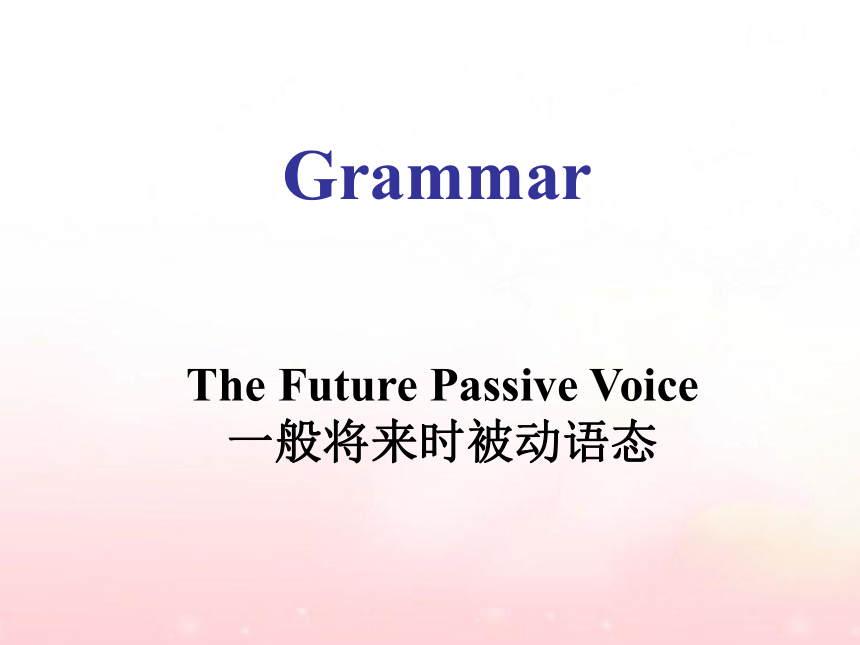(
课件网) Grammar The Future Passive Voice 一般将来时被动语态 被动语态的句子用“be动词+p.p. (过去分词)”来表达,如果要特别强调动作或行为的执行者时,句子后面需接by短语,译为“被(由)……”。 1. 被动语态的句型 肯定句:主语+be + p.p. (by …). 否定句:主语+be not + p.p. (by…). 一般疑问句:Be +主语+ p.p. (by…)? 特殊疑问句:疑问词+be +主语+ p.p. (by…) Review 2. 主动语态改成被动语态的步骤: 1) 先找出谓语动词; 2) 再找出谓语动词后的宾语; 3) 把宾语用作被动语态中的主语; 4) 注意人称、时态和数的变化。 He rides the motorbike to work every day. The motorbike is ridden to work (by him) every day. We call the snowman Mr. Strong. The snowman is called Mr. Strong (by us). A computer is used in our class every day. 一般现在时: S + am / is / are (not) +过去分词 computer, use, class We always keep the classroom clean. 2. People don't grow rice in the west of Japan. 3. They built a new bridge last year. The classroom is always kept clean. Rice isn’t grown in the west of Japan. A new bridge was built last year. 把下面句子中的主动语态改成被动语态。 Read the sentences from the text, paying attention to the italicized parts. The 2008 Olympic Games will be held in Beijing, China. 2. A new village for the athletes and all the stadiums will be built to the east of London. 3. When and where will the next Olympic Games be held will be + p.p. 一般将来时的被动语态 一般将来时被动语态 一般将来时被动语态表示: 1. 动作发生在将来; 2. 强调动作的承受者, 或不能或无须提及 动作的执行者。 3. 常有未来时间状语作时态标志。 一般将来时被动语态的构成: shall / will + be + p.p. 主语是第一人称时,常用shall;主语是第二或第三人称时,常用will。 We shall be punished if we break the rule. 如果我们违反规定,我们将要受到惩罚。 A new film will be shown next Thursday. 下周四将上映一部新电影。 a. He will plant more trees. More trees will be planted by him. b. She will take care of the children. The children will be taken care of by her. They will have a show tomorrow. A show will be had (by them) tomorrow. they, send to, hospital, right now a talk, give, soon They will be sent to the hospital right now. A talk will be given soon. The meeting won’t be held tomorrow. 明天不会举行会议。 The exhibition won’t be put off till next week. 展览会将不会推迟到下周。 一般将来时被动语态的否定式为: S + shall / will + not + be + p.p. (可缩写成shan’t或won’t) 一般将来时被动语态的一般疑问句为: Shall / Will + S + be +p.p. --Will the work be finished at once 这项工作会立刻被完成吗? --Yes, it will. 是的,立刻就完成。 一般将来时被动语态的特殊疑问句为: 疑问词 + shall / will + S + be +p.p. When will these books be published 这些书将在什么时候被出版? Whom will this report be written by 谁来写这份报告? 一般将来时被动语态的其他结构 表示将来意义的被动结构还有: 1. be going to be done; 2. be to be done; 3. will (shall) +get +done等。 Some old buildings are going to be put down. The 30th Olympic Games is to be held in London in 2012. The workers will ... ...

